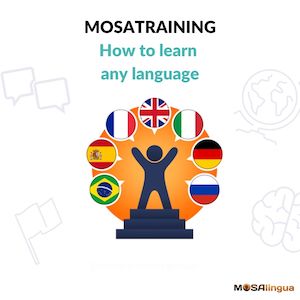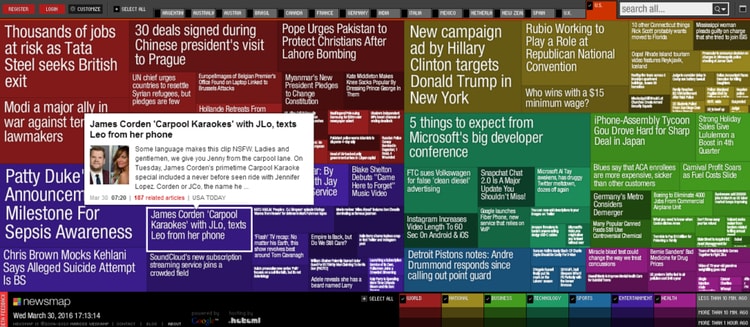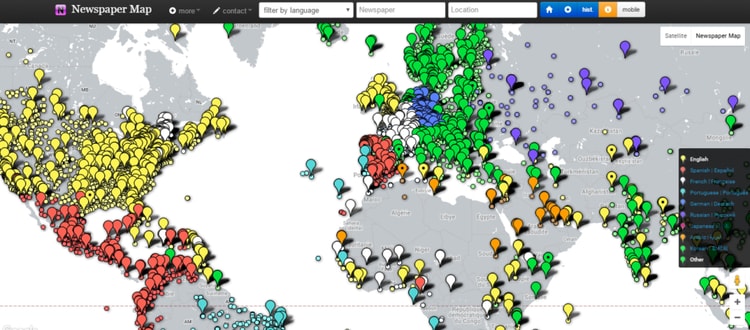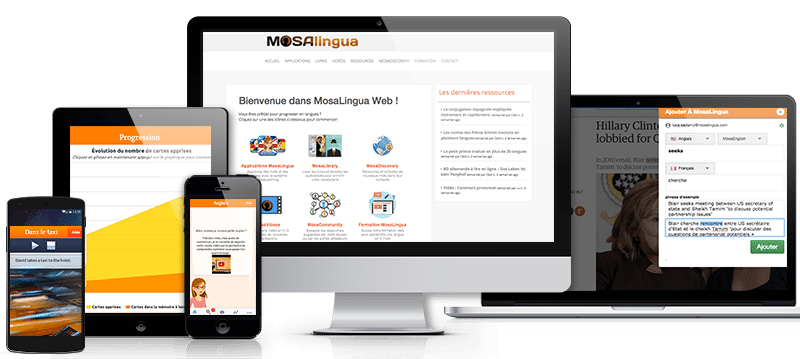There is a multitude of ways to learn a language, from reading a grammar textbook (😴) to listening to podcasts (😀). However, few are quite as informative and effective as reading the news online. You may think that finding newspapers in a different language would be extremely tricky if you don’t live abroad. But this is far from the case thanks to online news media!
Last Updated: 01/27/23

In this day and age, reading news stories from all over the world has never been more accessible. There has never been a better time to master the art of learning a language by using the technology that is right at your fingertips. Reading online news stories in a foreign language, combined with a method that helps you translate and remember words that you’re not familiar with, will pave the way for the new, fluent you! Read on to learn five tips to learn a language using online news media.
Why Learn a Language by Reading the News Online?
Online media, like a good novel or comic book, is an excellent learning tool. Why? Because it undeniably allows you to build your vocabulary. Whether you want to learn basic and common words or complex, industry-specific ones, by reading online media regularly, not only does your vocabulary expand, but you also learn about sentence structure, syntax, grammar, and conjugation. You get a good feel for a language in written form.
The biggest drawback of learning a language using the press (as with reading in general), is that it does not give you any indication as to how words are pronounced. However, later in the article, we’ll show you that, when combined with other methods, you can master the pronunciation of even the most difficult vocabulary you find in online news articles.
Besides the fact that online media is completely free to use, it allows you to practice a specific set of vocabulary, that YOU want to learn. By using such websites as Newsmap or Newspapermap (which you’ll read more about later on) you will have access to a broad variety of newspapers. Looking at websites like these will help you find articles on topics that are of interest to you. For instance, if you want to expand your sports vocabulary, head straight to the sports pages of a newspaper. The same goes for technology, business, arts and life, etc. Whatever subject you are interested in, an online newspaper has articles about it!
Enrich your vocabulary on any given subject, while also enriching your semantic fields (groups of similar words). In written press, it is not uncommon to come across a word and multiple synonyms many times, which helps you learn how to avoid repeating a word.
How to learn any language

News flash: those people aren’t any smarter than you are, and they don’t have any kind of special gift for language learning, either. It’s all because of the methods they use. Practicing with the latest and most effective techniques, along with a few expert tips, is a recipe for success.
It can work for you, too! MosaTraining combines all of these tips and techniques into one comprehensive, hands-on approach to language learning.
Sites to Use to Learn a Language through Online News Media
Earlier we mentioned the websites Newsmap.jp and Newspapermap.com – two very different websites with one common goal — to bring you the news!
- Newsmap is my favorite, as you are offered access to many countries per tab. Start by clicking on the country of your choice. On each tab, you’re given a page of headlines. This means that you don’t choose a specific newspaper, but instead a subject that you are interested in. This is what makes Newsmap so interesting. If you do not have all of the necessary details of a certain newspaper title, don’t panic. A pop-up (move your mouse over the title) will give you the article’s summary, date of publication, and the number of articles written on the particular subject (to deepen your search if necessary). To read the article, click on the headline, which will redirect you to the article on the newspaper’s website.
Note: This site uses a color-coding system for the front pages of the given newspapers. Each color corresponds to a subject, such as health, science, tech, entertainment, etc.
- Newspapermap is a rather well-built website, too. You don’t need to choose a specific topic, but you do need to know the specific newspaper you want to read. The site gives you a large world map and a multitude of location pins. Each point represents a specific newspaper. Click on it to be redirected to the newspaper’s website. It is both extremely simple and efficient.
Note: This site also lets you choose a newspaper by picking a certain language instead of finding it on the map.
Now that you know how to find news stories from across the globe, let’s take a look at five tips to learn a new language by reading them!
5 Tips to Learn a Language through Online News Media
1. (Try to) read every day
It’s crucial that you read the newspaper every day to learn, and especially to memorize new vocabulary. Make it part of your daily routine! I personally like checking the news in my target language over coffee before I head to work in the morning. The good news is that current events are just that. They change every day, so you get to learn about new subjects every day instead of endlessly reading the same kind of text (as is the case when you’re reading a novel).
Reading every day can also help you assess your progress. For instance, you come across a word you don’t understand on the first day. After several minutes of thinking, save the word as a new MosaLingua flashcard and bookmark the article to come back to later. The following day, when you read the same article with the same word in it, you will have a much easier time remembering it. Even if you don’t remember it right away, chances are, the day after that you’ll have it anchored in your brain.
This example may seem simple but it’s an outstanding way to memorize vocabulary in the long term through strategic repetition. (Check out our article on the spaced repetition system here). Each day, take the time to read for a few minutes in a foreign language. Combine this with the MosaLingua app’s SRS to help you remember the words and phrases you want to learn, and you’ll be making awesome progress in no time.
2. Use context clues for help
As mentioned earlier, before looking for a word you don’t know in the dictionary, we recommend that you first think critically. This is because one of the main benefits of reading online news, just like any other book, is that it gives you words in context, not just a nonsensical vocabulary list.
Before you jump right to the first dictionary or translation app you find, use the words surrounding the mystery word to attempt to find meaning. With some luck, you’ll find some synonyms in other parts of the article. That should help you guess the meaning of the word, and make new connections in the same semantic field.
This is quite a clever method when you have a grasp of sentence structure in your target language. It’s a good idea to use this technique when you already have an intermediate level in the language.
3. Make use of online dictionaries
I remember I once went totally OFF-TOPIC on a high school English paper. Why? Because I was missing the translation of ONE word. There was a single word that I didn’t understand, and there were no context clues to help me understand it. I was lost without that one word (today I know it well). I missed the entire big picture!
So yes, sometimes even after several minutes of reflection and deduction, you still won’t find a word’s meaning. A word that could change the entire meaning of the text, no less… The good news is that there are tools to help you quickly and easily locate the translation of these words, and you probably have at least one in your pocket right now! Online dictionaries and translation apps.
4. Create your own MosaLingua flashcards
Once you’ve found a word and its meaning, save it to your MosaLingua app. Review the new word using your app, and with strategic repetition, you’ll eventually memorize it for good. If it doesn’t already exist in the app, you can create custom flashcards with MosaLingua Premium!
How do you create a MosaLingua flashcard?
- Go to the “Explore” tab
- Click on “Useful Lists”
- Click on “My New Cards” and then the + sign
- Then, add the word with its translation and any additional comments (for instance, the word used in a sentence).
We wanted to create a comprehensive tool that allows you to create cards on the go when you are reading an online newspaper (or any other text for that matter). Meet MosaDiscovery!
You can quickly and easily install this tool on the browser of your choice. Here’s what you can do with it:
- look up the meaning of a word instantly from any web page
- add the word directly to your MosaLingua app to help you retain it in your long-term memory through the MOSALearning method
5. Learn pronunciation
When we learn a language, pronunciation is key. Unfortunately, the biggest downside of reading is that it does not allow us to learn pronunciation, just spelling. How, then, are you expected to know its pronunciation?
Couple this learning method of using online newspapers with a different method, based on spoken language. For instance, listen to audiobooks to improve your listening comprehension and pronunciation (by repeating words out loud).
How can you find the right pronunciation of a given word using only this method?
- Activate the text-to-speech accessibility feature that comes with most devices these days, and let it read the article to you
- We also highly recommend the crowdsourced pronunciation “dictionary” Forvo for individual words
- Google Translate is another great tool that gives you both the translation and pronunciation of the word, albeit by a synthetic voice
- Additionally, MosaLingua features pronunciation by native speakers for all of the words and phrases that come with the app.
Regularly reading an online newspaper is an effective way to learn a language. It is also an interesting learning method, as it allows you to latest stories in the news. Personally, I read Brazilian newspapers to keep me both informed on the latest news stories in Brazil (a country I particularly cherish) and to learn a language through memorizing new vocabulary (and refreshing without ever losing track).
Additionally, MosaLingua’s desktop app, included in MosaLingua Premium, gives you a wide variety of different newspapers, magazines, and other written materials to get you started on reading news stories in a new language.









Comments